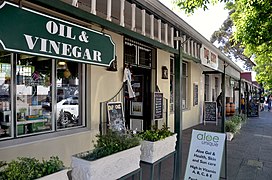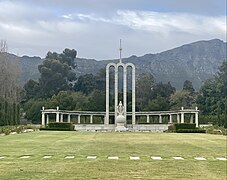Франшхук
Франшхук | |
|---|---|
Clockwise from top: Franschhoek Pass, the Huguenot Monument, Huguenot Museum, Bastille Festival, Boschendal Estate, Dutch Reformed Church, Franschhoek | |
| Motto(s): Dieu Est Mon Aide (French: God is My Helper) | |
| Coordinates: 33°55′S 19°08′E / 33.917°S 19.133°E | |
| Country | |
| Province | |
| District | Cape Winelands |
| Municipality | Stellenbosch |
| First Settled | 1688 |
| Government | |
| • Councillor | Reginald Pheiffer (DA)[1] |
| Area | |
| • Total | 1.8 km2 (0.7 sq mi) |
| Population | |
| • Total | 1,066 |
| • Density | 590/km2 (1,500/sq mi) |
| Racial makeup (2011) | |
| • White | 76.8% |
| • Black African | 15.5% |
| • Coloured | 6.2% |
| • Indian/Asian | 0.5% |
| • Other | 1.0% |
| First languages (2011) | |
| • English | 44.1% |
| • Afrikaans | 43.8% |
| • Xhosa | 1.6% |
| • Sotho | 0.5% |
| • Other | 10.0% |
| Time zone | UTC+2 (SAST) |
| Postal code (street) | 7690 |
| PO box | 7690 |
| Area code | 021 |
Franschhoek ( [fransˈɦuk] ; африкаанс для «французского уголка», голландское правописание до 1947 года Франше Хук , французский : Le Coin Français ) - маленький город в провинции Западный Кейп и один из старейших городов в Южной Африке. Ранее он был известен как Олифантс Хук (так как были обширные группы слонов, бродящих по долине). Он расположен примерно в 75 километрах (47 миль) от Кейптауна , в 45 минутах езды. Вся территория, в том числе городки, такие как Grooendal и пригороды, такие как Wemmershoek , насчитывает чуть более 20 000 человек, в то время как в своем собственном городе, известном как Hugenote, [ 4 ] Население составляет около 1000 человек. С 2000 года он был включен в Stellenbosch муниципалитет . В 2022 году Франшхук был упомянут в журнале Time как одно из 50 лучших мест в мире, где можно посетить.
История
[ редактировать ]Franschhoek's original inhabitants are the Khoisan peoples. They are now mostly extinct, but their descendants continue to live in the area as mixed race (Khoisan and French/Dutch) people. In 1685, King Louis XIV banned Protestantism in France. Hundreds of French Huguenots were forced to flee their country. In 1688, almost 300 French Huguenots arrived at the Cape of Good Hope by ship and were given the Franschhoek Valley to settle.[citation needed]
The French Huguenot refugees populated the valley, establishing farms and businesses, bringing with them their French culture and experience in agriculture. The name of the area soon changed to le Coin Français ("the French Corner"), and later to Franschhoek (Dutch for "French Corner"), with many of the settlers naming their new farms after the areas they had left behind in France.[5] La Motte, Champagne, La Cotte, Cabrière, La Provence, Bourgogne, La Terra de Luc and La Dauphine were among some of the first established farms — most of which still retain their original Cape Dutch farm houses today. These farms have grown into renowned wineries. Many of the surnames in the area are of French origin, e.g. Du Toit, Marais, Du Plessis, Malan, Malherbe, and Joubert. The French settlers tried fiercely to hold onto their language, but were forced over generations by the Dutch and British colonialists through schooling to integrate into local society.[citation needed]
This heritage is shown today by the Huguenot Monument which stands at the end of the town. The nearby Huguenot Memorial Museum adjacent to the monument explores the history of the French Huguenots who settled in the Cape, and especially in the Franschhoek Valley. On exhibition are the various tools they used to make wine, the clothes they wore, and interpretation of their culture and goals.
The Cape Dutch architecture in much of the village is unspoiled, as restrictions have been placed on the extent of renovations and new construction in order to preserve the spirit of the original French settlers to the area.
In 1904, a 28 km (17 mi) branch line was built between Paarl and Franschhoek to serve as an alternative to ox-drawn carts for farmers wanting to get their produce to market. Steam locomotives operated along the route until diesel locomotives took over in the 1970s and then, in the 1990s, as the need for rail transport decreased, service along the railway line was discontinued. The branch line was reinstated in 2012[6][7] by a private operator and now sees service as the Franschhoek Wine Tram,[8][9] a tourism project utilizing newly constructed double-decker trams modeled after the Blackpool Corporation Tramway's Double Deck Balcony Tramcar of circa 1923 to transport tourists between wine estates in the area.
Recent developments
[edit]Once a quiet country retreat, the originally French settled village and region began experiencing a boom in the 1990s, and property prices increased. The ideal summer weather, snowy peaks in winter and proximity to Cape Town have turned Franschhoek (le coin Français) into one of South Africa's most sought after residential addresses. The construction of the new English-medium private Bridge House School outside the village has also attracted many urban dwellers to the village.[citation needed]
Franschhoek is notable for having some of the top restaurants in the country within its borders. This fact, together with the strong wine culture, and pristine natural and architectural beauty has made Franschhoek into what many describe as the "food and wine capital" of South Africa. This village hosted one of the top 50 restaurants in the world The Tasting Room, according to the "S.Pellegrino world's 50 best restaurants"-ranking and a famous Belgian Pâtisserie for Belgian pralines.[citation needed] The town hosts a number of notable restaurants and wineries such as Haute Cabrière.
The attributes of the village have turned Franschhoek into a popular tourist destination, with dozens of bed & breakfasts and small cottages available for accommodation.
The shopping experience in Franschhoek is known to be very interesting with several independent boutiques, menswear shops and quality homeware stores. The art galleries are plentiful and excellent.
Franschhoek's weekend Bastille Festival has been celebrated every July since 1994, the year of the first South African general election with universal adult suffrage marking the end of the apartheid era.[10][11]
International relations
[edit]Franschhoek is a twin town or sister city of:
Gallery
[edit]-
Franschhoek October 2015
-
Franschhoek and Berg River Valley from Franschhoek Pass
Notable residents
[edit]- Pieter Daniel Rossouw (1845–1896), pastor and Afrikaans language writer.
- Hendrik Johannes van der Bijl (1887–1948), South African electrical engineer and industrialist.
- George Daneel (1904–2004), South African rugby player.
- Cecile Cilliers (1933–2018), Afrikaans freelance journalist and writer.
- Vito Roberto Palazzolo (1947), Italian businessman and alleged mafia member.
- Mark Solms (1961), South African psychoanalyst and neuropsychologist.
- Margot Janse (1969), chef.
- Reuben Riffel (1974), South African celebrity chef, restaurateur and media personality.
See also
[edit]References
[edit]- ^ "Meet Your Ward Councillors". Retrieved 5 July 2024.
- ^ Jump up to: a b c d "Sub-Place Hugenote/Franschhoek". Census 2011.
- ^ Jump up to: a b [1] from Census 2011.
- ^ "Sub-Place Hugenote/Franschoek", Census 2011
- ^ [The Old Buildings of the Cape, Hans Fransen. Jonathan Ball Publishers:Cape Town. p.283]
- ^ Cape Argus - Fran tram to rattle winelands
- ^ "Paarl Post - Franschhoek wine tram here". Archived from the original on 2014-03-01. Retrieved 2013-03-15.
- ^ "Virgin Atlantic - Cape Winelands: New Franschhoek Wine Tram". Archived from the original on 2013-07-11. Retrieved 2013-03-15.
- ^ Franschhoek Wine Valley - Franschhoek Wine Tram
- ^ «Оуи, это день Бастилии в Франшхуке» . Mail & Guardian . 14 июля 2007 года. Архивировано с оригинала 14 июля 2014 года . Получено 14 июля 2014 года .
- ^ «Фестиваль Франшхук Бастилия» 2014 года » . Capetownmagazine.com . Архивировано с оригинала 15 июля 2014 года . Получено 14 июля 2014 года .
На этот раз ежегодная встреча празднует 21-й день рождения


















